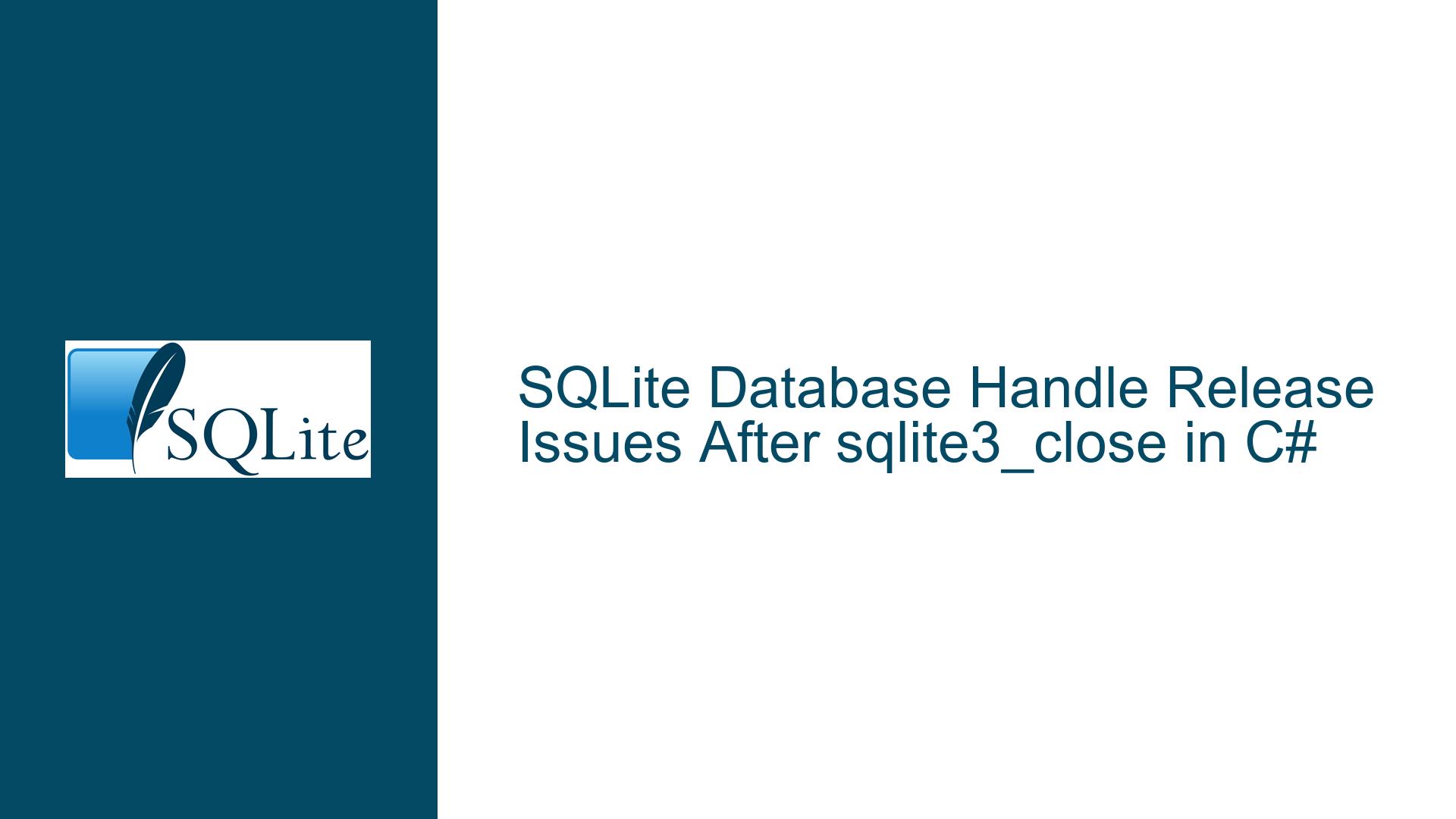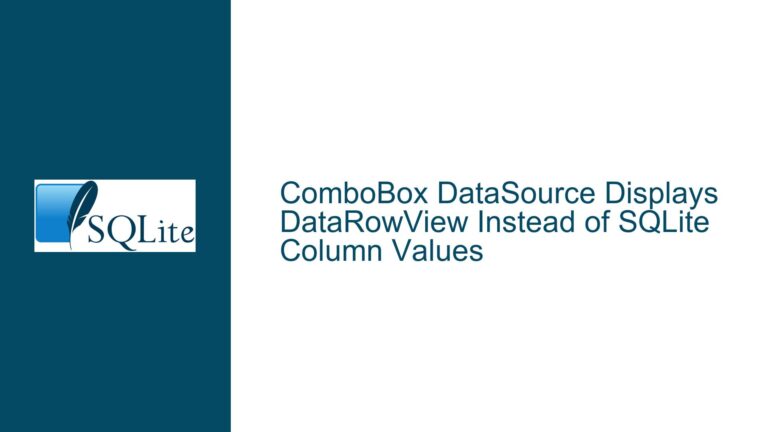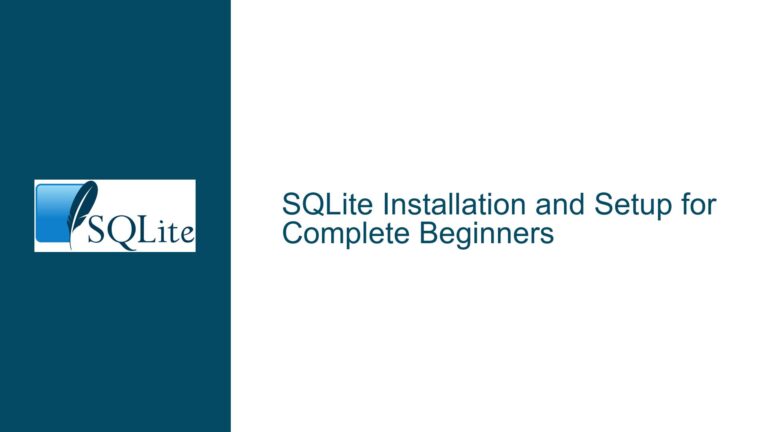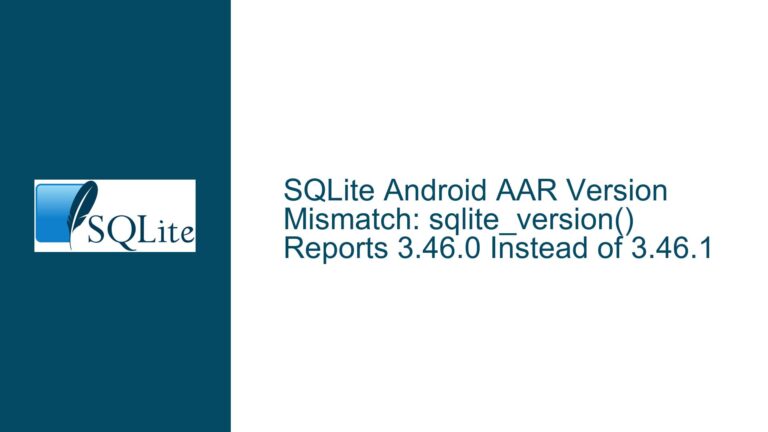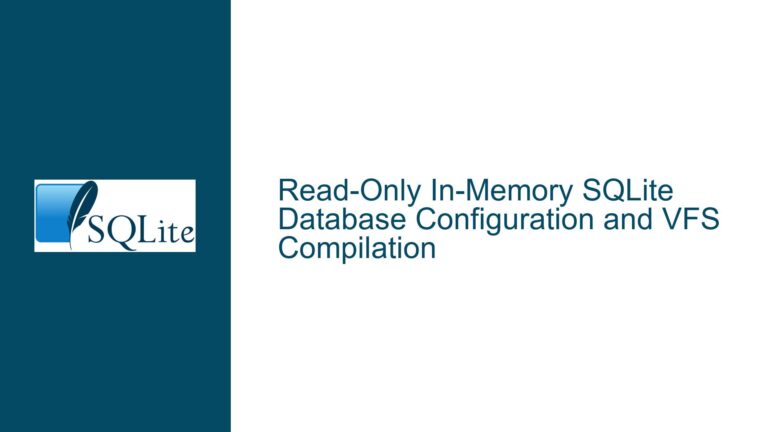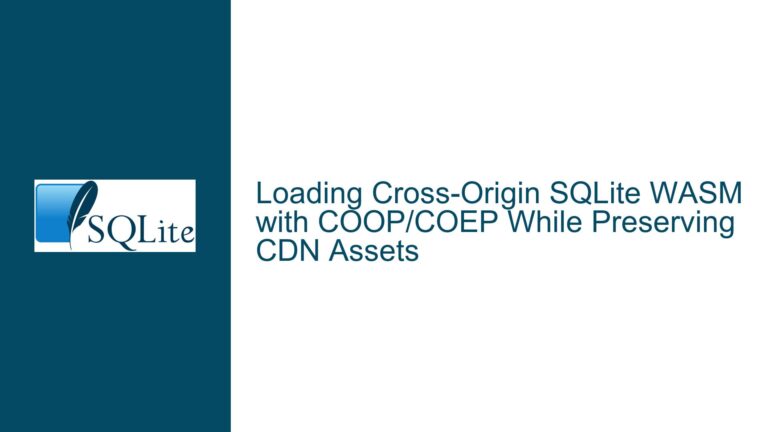SQLite Database Handle Release Issues After sqlite3_close in C#
SQLite Database Handle Not Released After sqlite3_close in C#
When working with SQLite in C#, particularly when interfacing directly with the SQLite C API via P/Invoke, a common issue arises where the database handle (sqlite3*) is not properly released after calling sqlite3_close. This issue manifests when attempting to rename or delete the database file immediately after closing the connection, resulting in access denied errors or similar file system issues. The problem is particularly prevalent when using raw pointers (IntPtr in C#) to manage the database handle, as the underlying native resources may not be fully released even after sqlite3_close returns SQLITE_OK.
The core of the issue lies in the interaction between managed and unmanaged memory in C#. When sqlite3_close is called, the SQLite C library releases the resources associated with the database handle. However, in a C# environment, the IntPtr representing the database handle may still hold a reference to the now-invalid memory location, preventing the operating system from fully releasing the file lock on the database. This behavior is not observed in native C/C++ applications, where the handle is immediately released upon successful closure.
Interrupted Resource Release Due to Managed-Unmanaged Memory Interaction
The primary cause of this issue is the mismatch between how SQLite manages resources in native code and how C# manages memory and handles. In native C/C++, calling sqlite3_close ensures that all resources associated with the database handle are released, and the file lock is removed. However, in C#, the IntPtr type used to represent the database handle does not automatically release the underlying native resources when sqlite3_close is called. This is because IntPtr is a managed type that simply wraps a pointer to unmanaged memory, and it does not have any built-in mechanism to track or release native resources.
Another contributing factor is the use of P/Invoke to call the SQLite C API directly. When using P/Invoke, the C# runtime does not have full visibility into the lifecycle of the native resources. As a result, it cannot automatically release the resources when they are no longer needed. This is in contrast to using a managed wrapper like System.Data.SQLite, which handles the interaction between managed and unmanaged code and ensures that resources are properly released.
Additionally, the behavior of sqlite3_close_v2 further complicates the issue. While sqlite3_close immediately releases the resources, sqlite3_close_v2 defers the release until all outstanding operations are complete. This can lead to situations where the database file remains locked even after the close operation appears to have succeeded. In C#, this behavior can be particularly problematic, as the managed code may not be aware of the deferred release and may attempt to rename or delete the database file prematurely.
Properly Releasing SQLite Database Handles in C# with P/Invoke
To resolve the issue of unreleased database handles in C#, it is necessary to ensure that the native resources are properly released and that the file lock is removed. This can be achieved through a combination of proper resource management and careful handling of the database handle. Below are the steps to address the issue:
Step 1: Use sqlite3_close_v2 Instead of sqlite3_close
The first step is to replace calls to sqlite3_close with sqlite3_close_v2. The sqlite3_close_v2 function is designed to defer the release of resources until all outstanding operations are complete, which can help avoid situations where the database file remains locked. While this does not directly solve the issue of unreleased handles in C#, it ensures that the SQLite library itself does not prematurely release resources that may still be in use.
[DllImport("sqlite3", CallingConvention = CallingConvention.Cdecl)]
private static extern int sqlite3_close_v2(IntPtr db);
Step 2: Explicitly Release the Database Handle
To ensure that the database handle is properly released, it is necessary to explicitly release the native resources associated with the IntPtr. This can be done by calling the sqlite3_finalize function on any outstanding prepared statements and then calling sqlite3_close_v2 to close the database connection. After closing the connection, the IntPtr should be set to IntPtr.Zero to indicate that the handle is no longer valid.
IntPtr dbHandle;
int result = sqlite3_open("d:/sqlite32/db/mydb.db", out dbHandle);
// Perform database operations...
// Finalize any prepared statements
sqlite3_finalize(statementHandle);
// Close the database connection
result = sqlite3_close_v2(dbHandle);
// Explicitly release the handle
dbHandle = IntPtr.Zero;
Step 3: Use a Managed Wrapper for Resource Management
While it is possible to manage the database handle manually, using a managed wrapper like System.Data.SQLite is highly recommended. The System.Data.SQLite library handles the interaction between managed and unmanaged code and ensures that resources are properly released. If you need to use a specific version of SQLite, you can build System.Data.SQLite from source with the desired version of the SQLite library.
using (var connection = new SQLiteConnection("Data Source=d:/sqlite32/db/mydb.db"))
{
connection.Open();
// Perform database operations...
}
Step 4: Implement a Custom Finalizer for the Database Handle
If you must use P/Invoke and manage the database handle manually, you can implement a custom finalizer to ensure that the native resources are released when the object is garbage collected. This approach involves creating a class that wraps the IntPtr and implements the IDisposable interface to release the resources when the object is disposed.
public class SQLiteDatabaseHandle : IDisposable
{
private IntPtr _dbHandle;
public SQLiteDatabaseHandle(string connectionString)
{
int result = sqlite3_open(connectionString, out _dbHandle);
if (result != SQLITE_OK)
{
throw new SQLiteException("Failed to open database.");
}
}
~SQLiteDatabaseHandle()
{
Dispose(false);
}
public void Dispose()
{
Dispose(true);
GC.SuppressFinalize(this);
}
protected virtual void Dispose(bool disposing)
{
if (_dbHandle != IntPtr.Zero)
{
sqlite3_close_v2(_dbHandle);
_dbHandle = IntPtr.Zero;
}
}
}
Step 5: Verify Resource Release with File Operations
After closing the database connection and releasing the handle, you should verify that the database file can be renamed or deleted. This can be done by attempting to perform a file operation and checking for any errors. If the file operation succeeds, it indicates that the resources have been properly released.
SQLiteDatabaseHandle dbHandle = new SQLiteDatabaseHandle("d:/sqlite32/db/mydb.db");
// Perform database operations...
dbHandle.Dispose();
try
{
File.Move("d:/sqlite32/db/mydb.db", "d:/sqlite32/db/mydb_renamed.db");
Console.WriteLine("Database file renamed successfully.");
}
catch (IOException ex)
{
Console.WriteLine("Failed to rename database file: " + ex.Message);
}
Step 6: Consider Using SQLite’s WAL Mode
If the issue persists, consider enabling SQLite’s Write-Ahead Logging (WAL) mode. WAL mode can improve concurrency and reduce the likelihood of file locks persisting after the database is closed. To enable WAL mode, execute the following SQL command after opening the database:
using (var connection = new SQLiteConnection("Data Source=d:/sqlite32/db/mydb.db"))
{
connection.Open();
using (var command = new SQLiteCommand("PRAGMA journal_mode=WAL;", connection))
{
command.ExecuteNonQuery();
}
}
By following these steps, you can ensure that SQLite database handles are properly released in C#, allowing you to rename or delete the database file immediately after closing the connection. This approach addresses the underlying issues related to managed-unmanaged memory interaction and provides a robust solution for managing SQLite resources in a C# environment.
